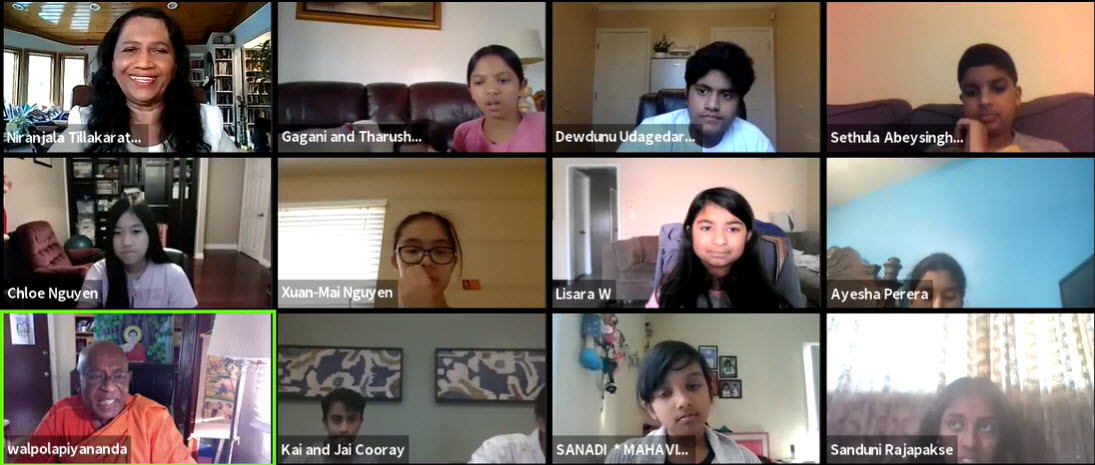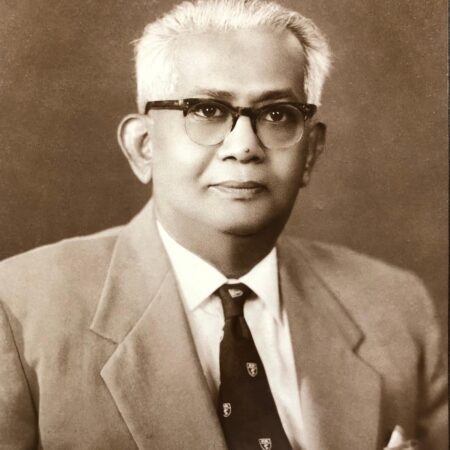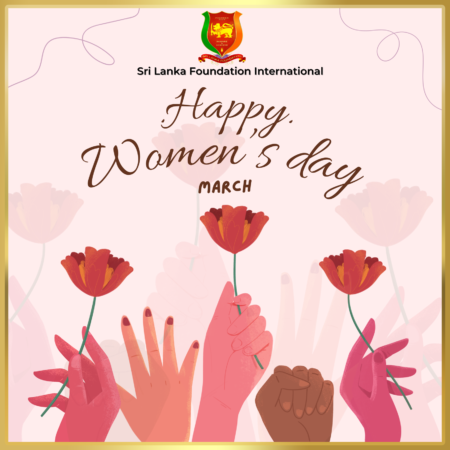They plan to teach at least one lesson per month. They will send the students the material related to the topic, reading comprehension questions, and discussion topics a week in advance. There is a Google form for students to sign up for the question(s) that they are interested in addressing. Students then can read, research, and think about the question(s), and share their thoughts with the rest of the class.
Link to the “Visakha lesson”
https://www.facebook.com/dharma.vijayavihara/videos/3548374855243024
https://www.youtube.com/watch?v=lU1373ns-VA
Description of the lesson:
“During this week’s Sunday School class, we will be discussing Visakha, Buddha’s greatest female lay disciple.
Visakha lived during Buddha’s time and Buddha said Visakha was his greatest female lay disciple. She practiced a Buddhist way of life since she was seven years old and had confidence in the Buddha, Dhamma, and Sangha. Visakha was well known for her generosity towards the Buddha and Sangha. A role model to many and beloved by all, Visakha was an intelligent woman, who not only thought critically, but also spoke her mind and stood up for what she believed in. Because of her qualities, she was invited to settle the disputes in the female sangha.
During Sunday school class, we will learn some of the stories where she displayed these qualities. In one of the discourses the Buddha delivered, he told Visakha about four qualities that a woman can practice to be a spiritual person living a moral life in this world and in the next life. These are:
confidence in the Buddha, Dhamma and Sangha (saddhā)
virtue (sīla)
generosity (cāga)
wisdom (pañña)
1) Short Answer Questions (younger students)
For today’s first assignment, let’s focus on two qualities, virtue and generosity, and how you practice them. You can answer these questions with a short answer essay or creatively (for example, poem, drawing, etc.).
Virtue (sīla) can be practiced by following the Five Precepts. The Five Precepts are the Buddhist version of a code of conduct or rules to help people behave in a moral and ethical way. After taking refuge in Buddha, Dhamma, and Sangha, we promise to follow these five precepts. When we follow the Five Precepts, we can live a morally good life.
Take one of the five precepts and share how you practice it in your daily life.
Generosity (cāga) can be practiced by giving charity and alms, and by having an open mind without stinginess.
How do you practice generosity in your daily life? Share two ways how you practice it in your daily life.
2) Discussion Questions (all students) Visakha always spoke up – sometimes to clear misconceptions about her, defend herself from unjust accusations and misunderstood situations, and openly practicing Buddhism in her husband’s household where it was not practiced.
Standing up for what you believe in is an essential life skill. By asserting yourself, you are actively taking charge of your life. Asserting yourself can be scary, though, since you may be afraid of offending people or standing out from a crowd. By truly knowing yourself and your convictions, however, you will be able to find the courage to stand up to make a difference for yourself or others.
First answer the question:
What is something that is important to you that you believe in? For example, treating others with respect and being treated by others with respect, fairness and equality, community service, climate change, democracy, antiwar, etc.
Then answer one of these questions:
1) What is something in the world you would like to change? How would you like to change it?
2) Have you ever experienced a situation with classmates or friends where you wanted to speak up about something you felt was wrong but didn’t? How did you feel?
3) Have you ever stood up for your beliefs? What did you do or say? How did that make you feel?
4)How has believing in yourself helped you change your life and/or reach your goals?
5) Is there anyone in your life that you admire or consider a role model that you look up to? How have you learned from their actions and qualities?
We will learn in the class how she practiced some of these qualities in her life.
Please read the Chapter 22, titled Visakha in “Thus We Heard, recollections of the life of Buddha” by Bhante Walpola Piyananada and Stephen Long.
The chapter as well as questions are attached here. These questions address the life of Visakha and her qualities, and also how we can incorporate some of her qualities in our lives.
Please sign up for a question or more in the attached Google form. Read, research, and think about the question(s), so you can share your thoughts with the rest of the class. See you on Sunday!
Dr. Niranjala Tillakaratne and Mihiri Tillakaratne

Bios for Niranjala Tillakaratne for SLF

Bios for Mihiri Tillakaratne for SLF











![TV-Poster-All-Exhibition-Sri-Lanka-in-Focus-USA-2025[1]](https://www.srilankafoundation.org/wp-content/uploads/2025/04/TV-Poster-All-Exhibition-Sri-Lanka-in-Focus-USA-20251-450x450.jpg)










